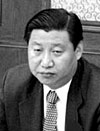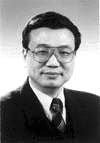Earlier this month, China’s legislature gathered and, among other things, reelected Hu Jintao as the country’s president — no surprise there. But the election of Xi Jinping as vice president, rather than Li Keqiang, Hu’s protegé, dealt Hu an “unexpected blow”, writes Damien Ma in the New Republic:
Though mostly unknown to Americans, these two politicians are now poised to compete for China’s presidency when Hu is expected to step down in 2012. Though such a competition will play out in behind-the-scenes political maneuvering, this marks the first time in modern Chinese politics where two candidates–with significantly different backgrounds and policy orientations–are likely to vie for the country’s top post, an outcome that will have important implications for the country’s future and its relationship with America.
A so-called “princeling”, Xi Jinping comes from a prominent military family and served as governor of prosperous Fujian and Zhejiang provinces, and later was head of the Communist Party in Shanghai.
Li Keqiang’s was also a governor and a party chief but in the “relative economic backwaters of central China and the rustbelt in the north, where remnants of a socialist economy lay in tatters,” Ma writes.
The vastly different character of the provinces they managed has certainly colored each man’s perspective on economic development and social conditions–particularly important as China grapples with the monumental task of appeasing the millions grumbling about inheriting the social discontents of a growth-at-all-costs model. Xi demonstrated his managerial competence in the richer provinces and views maintaining economic growth–a necessity if the party wants to keep unemployment rates low and maintain its popularity–as an imperative. His policies would thus likely favor business interests, and would probably be more inclined to strengthen ties with Washington.
Li, who oversaw poorer regions and worked on an agricultural commune in his youth, seems to understand the plight of the “losers” in China’s drive toward prosperity. In a year in which domestic issues such as health care, social security, and the Olympics seem to rule the day in China (Premier Wen’s state-of-the-union address hardly referred to foreign policy), Li’s influence may be felt in reshaping China’s growth model to help those left behind amid the country’s breakneck development.








